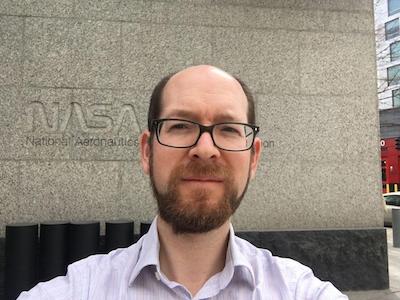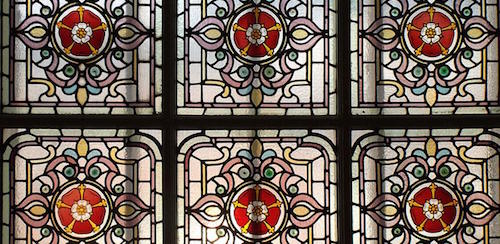Dr Joseph Webster awarded a 2020 Philip Leverhulme Prize
Dr Joseph Webster has been awarded a prestigious Philip Leverhulme Prize. The prize is one of the most coveted awards for early career academics. It rewards emerging scholars whose work has already had an international impact and whose future career are exceptionally promising.
The prize recognizes Dr Webster’s work in anthropology of religion where he has established himself as one of the leading researchers on contemporary Protestantism in Scotland and the global north. His first book, The Anthropology of Protestantism (2013), studies apocalyptic sign searching among an Exclusive Brethren fishing community in Gamrie, Northeast Scotland. This year he published his second book, The Religion of Orange Politics, that was the first academic study of the Orange Order in Scotland. His research on the Orange Order had a significant role in the repeal of the Scottish Parliament’s Offensive Behaviour at Football Act.
The Philip Leverhulme Prize will enable Dr Webster to conduct a new comparative, ethnographic study of contemporary apocalyptic religion in Northern Ireland. The project, entitled 'The Morality of Millenarianism', challenges the two main social scientific theories of millenarianism which understand the motivations of apocalyptic believers as either a symptom of poverty or a form of self-deception. In contrast, Dr Webster examines the morality of millenarianism by examining believer’s theological commitments and ethical actions.
Apocalypticism in Ulster is reaching new heights with the emergence of Covid-19 and growing fears about the return of paramilitary violence post-Brexit. Dr Webster’s research has important contemporary significance and promises to shed light on marginalised and misunderstood communities.
Cambridge Inter-faith Programme grant successes
1. DAAD-Cambridge project to fund a three year long series of workshops: Entangled and Disentangled Otherings: Critical Perspectives on the Relationship of Antisemitism and racism (Prof. Esra Özyürek)
Entangled and Disentangled Otherings: Critical Perspectives on the Relationship of Antisemitism and racism. Three planned workshops will build on a workshop organized by Center for Anti-Semitism Research in Technical University, International Consortium for Research on Antisemitism and Racism, and Martin-Buber Chair for Jewish Thought and Philosophy at the Goethe University Frankfurt am Main, funded by Fritz Thyssen Stiftung and Alfred Toepfer Stiftung F.V.S. The series we will organize at Cambridge will be a collaboration between Cambridge Interfaith Programme at Divinity Faculty, Antisemitism Research Center at Technical University, Berlin, and Pears Institute for the Study of Antisemitism at Birkbeck University, London. It will bring together leading scholars who work on Antisemitism, Islamophobia, and other kinds of racism and discrimination, and especially those who focus on the complicated relationships among them. In our first meeting in Cambridge we will talk about what are the conditions that make alliances between activist groups possible and also difficult. The second meeting will be done with a select number of scholars who took part in the first and second workshops and will focus on a book manuscript and the third workshop will be dedicated to working on a research grant to be submitted to major research funders in the UK and in Germany.
2. Scripture & Violence Project Awarded Impact Grant (Dr Julia Snyder, Dr Daniel Weiss)
A grant has been awarded to Dr Julia Snyder, Dr Daniel Weiss, and CIP to equip religious and interfaith leaders to address common concerns about religion, scripture, and violence.
A variety of online and print resources are being developed for leaders of religious and interfaith organizations to use in training their own members to grapple with scriptures that seem to condone violence – from their own tradition or other traditions – and to respond to concerns in wider society about these scriptures and the religious traditions that consider them sacred. The resources are designed to allow group leaders easily, confidently, and effectively to facilitate nuanced discussions about these issues.A £10,000 grant from the Arts and Humanities Impact Fund at the University of Cambridge will support development of these resources, which focus on scriptures from the Christian, Muslim, and Jewish traditions.
The project builds on academic research contained in Snyder and Weiss, eds., Scripture and Violence (London: Routledge, 2020), and a series of AHIF-funded impact events organized by Dr Giles Waller and Dr Weiss in 2019.
The project coordinators are currently seeking religious and interfaith organizations to help pilot test materials, at online or in-person workshops. If your church, mosque, synagogue, interfaith group, or student religious society is interested in holding such a workshop, please contact Dr Snyder at jas249@cam.ac.uk.
Resources will be available at www.scriptureandviolence.org beginning later this year.
3. Cambridge Public Engagement Starter Fund: Shared Sacred Landscapes: Interfaith Dialogues in Cambridge (Dr Safet HadziMuhamedovic)
Safet will develop an exhibition of anthropological photography, a public symposium and an interactive website to further our understanding of sacred environments shared by different religious communities. Inaugurated during the UN World Interfaith Harmony Week in 2021, the exhibition will showcase diverse examples of co-orchestrated rituals, feasts and shared sacred spaces that speak of rich historical and present-day encounters in the polities increasingly partitioned along the lines of religious identity. Building upon Safet’s ethnographic research of syncretic religion in the Mediterranean, the symposium will consider the importance of shared landscapes and their main obstacles in different contemporary contexts. The project will also establish a partnership and knowledge exchange between the Cambridge Inter-Faith Programme (CIP) and the Cambridge Central Mosque.
University Global Humanities Initiatives
Dr Joerg Haustein, with much work from Dr Chris Jones and Charity Green, has been granted money from the University Global Humanities Initiative to host a two-day networking conference concerned with Buddhist identity in twenty-first century Asia. The conference will bring together scholars especially from the ‘the Global South'. Input was also provided by Drs Giles Waller and Ankur Barua.
Through FAMES, our Sanskrit teachers Dr Vincenzo Vergiani and Dr Jonathan Duquette along with our own Dr Ankur Barua, have been granted money from the same source for an International workshop on Late Vedānta Philological Encounters between Western scholars and Indian pandits. This will involve meeting and discussion between Western researchers and local pandits (especially from South India, where the Vedānta tradition is particularly strong).
Cambridge-Stockholm Collaborative Research Grant: 'The Mutability of Apocalyptic'
Dr Justin Meggitt and Dr Emmanouela Grypeou (Stockholm) have been successful in an application to the Cambridge-Stockholm Collaborative Research Grants Scheme. They shall be holding a number of multidisciplinary seminars involving colleagues from both universities on the project theme of 'The Mutability of Apocalyptic' at both Cambridge and Stockholm. This will also involve our hosting Emmanouela in Cambridge for an extended visit.
Neoplatonism and Abrahamic Traditions
Dr Dragos Calma (Clare College) has won a €1,992,643 ERC Consolidator Grant 2017, Neoplatonism and Abrahamic Traditions
The project, the only ERC_Consolidator Grant in Social and Human Sciences awarded to the University of Cambridge in 2017 and 2016, will be hosted by the Cambridge Centre for the Study of Platonism in the Faculty of Divinity.
It offers an original and ground-breaking account of the impact of Pagan Hellenic Neoplatonism on the Abrahamic traditions. It focuses mainly, but not exclusively, on the Elements of Theology of Proclus (fifth century) which occupies a unique place in the history of thought.
Together with its ninth-century Arabic adaptation, the Book of Causes, it has been translated, adapted, refuted and commented upon by Muslim, Jewish and Christian thinkers across centuries, up to the dawn of modernity.
Finding Zion in South Africa
"Founded in boom-era Chicago of the 1890s, the Zionist church taught that medicine and doctors should be eschewed in favour of exclusive reliance upon God for healing. This teaching resonated with Chicago’s working-class European and African-American migrants, eager to forge their futures in the new Northern industrial metropolis. In a period in which immigrants were attempting to carve out social and economic standing amidst hostility from entrenched white native-born populations, divine healing – with its repudiation of the learned expertise of doctors and medical professionals in favour of the humble prayer of common-place people – was powerfully attractive."
Below is a short interview with Joel Cabrita about this research.
Read more about this research.
Divinity academics research societal implications of astrobiology

Dr Andrew Davison, Starbridge Lecturer in Theology and Natural Sciences, and Dr Tim Jenkins, Reader in the Anthropology and Religion, are the recipients of research grants this year from the Center of Theological Inquiry at Princeton. The programme is on the societal implications of astrobiology, and was made possible by major grants from the NASA Astrobiology Program and the John Templeton Foundation...
Read more about this research.
Reforming religion: an intimate history

Through focusing on late Medieval material culture and microhistory, Cambridge historian Professor Eamon Duffy has produced a rich reinterpretation of the traditional role of religion in this enduringly popular – and turbulent – period of English history.
Tudor England – with its potent mix of intrigue, violence and religion – can lay claim to being this country's most popular period of history. From Robert Bolt's A Man for all Seasons to Hilary Mantel's Wolf Hall trilogy, the period continues to inspire writers and fascinate audiences. And, despite its popularity, it remains a fertile period for historical scholars like Cambridge's Professor Eamon Duffy.
